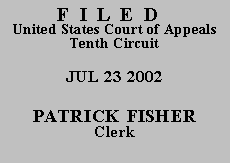

| UNITED STATES OF AMERICA,
Plaintiff - Appellee,
v.
DEWAYNE BROOKS Defendant - Appellant. |
No. 01-1594
(D.C. Nos. 01-CV-1242, 96-CR-303-AJ) |
In Apprendi, the Supreme Court held that "[o]ther than the fact of a prior conviction, any fact that increases the penalty for a crime beyond the prescribed statutory maximum must be submitted to a jury, and proved beyond a reasonable doubt." Apprendi, 530 U.S. at 490. Where, as here, the quantity of drugs involved in the crime was not submitted to the jury and proven beyond a reasonable doubt, a defendant may be sentenced only under 21 U.S.C. § 841(b)(1)(C), which defines penalties for offenses involving cocaine base without making reference to a specific drug quantity. See United States v. Jackson, 240 F.3d 1245, 1248 (10th Cir.), cert. denied, 122 S. Ct. 112 (2001); see also United States v. Jones, 235 F.3d 1231, 1235 (10th Cir. 2000) ("A district court may not impose a sentence in excess of the maximum set forth in 21 U.S.C. § 841(b)(1)(C) unless the benchmark quantity of cocaine base for an enhanced penalty is alleged in the indictment in addition to being submitted to the jury and proven beyond a reasonable doubt.").
Mr. Brooks was charged and convicted of violating 21 U.S.C. § 841(a), a crime that does not require a specific quantity of drugs as an element of the offense. See 21 U.S.C. § 841(a) (making it unlawful to knowingly or intentionally "manufacture, distribute, or dispense, or possess with intent to manufacture, distribute, or dispense, a controlled substance. . . ."). He was also convicted under section 841(b)(1)(A)(iii), which does involve a specific quantity of drugs: 50 grams or more of a mixture or substance which contains cocaine base. See 21 U.S.C. § 841(b)(1)(A)(iii). That statute requires a sentence ranging between ten years and life in prison. See id. Because the matter of quantity of drugs was not submitted to the jury, however, pursuant to Apprendi Mr. Brooks could only be sentenced within the punishment range set out in section 841(b)(1)(C), i.e., a maximum sentence of twenty years in this case, which is applicable regardless of the drug quantity involved.
Mr. Brooks' sentence did not exceed the twenty-year statutory maximum penalty for the crime for which he was convicted. Thus, there was no Apprendi violation. See, e.g., United States v. Thompson, 237 F.3d 1258, 1261-62 (10th Cir. 2001). If Mr. Brooks had received a sentence greater than twenty years, we would have considered whether to exercise our plain error discretion. See, e.g., United States v. Cotton, 122 S.Ct. 1781 (2002). There is no need to do so here.
In order to obtain a COA, Mr. Brooks must show that the issue would be debatable among jurists, that a court could resolve the issues differently, or that the question deserves further proceedings. See Slack v. McDaniel, 529 U.S. 473, 483-8 (2000). We have reviewed Mr. Brooks' briefs, the district court's order, and the entire record on appeal. Because Mr. Brooks' sentence did not exceed the statutorily-mandated maximum under 21 U.S.C. § 841(b)(1)(C), Mr. Brooks has failed to raise a debatable Apprendi issue. We therefore deny his request for a COA.
We GRANT the motion to proceed in forma pauperis, DENY the motion to stay the proceedings, DENY the motion for a certificate of appealability, and DISMISS the appeal.
ENTERED FOR THE COURT
Stephanie K. Seymour
Circuit Judge
*.After examining appellant's brief and the appellate record, this panel has determined unanimously that oral argument would not materially assist the determination of this appeal. See Fed. R. App. P. 34(a)(2) and 10th Cir. R. 34.1(G). The case is therefore submitted without oral argument. This order and judgment is not binding precedent, except under the doctrines of law of the case, res judicata, or collateral estoppel. The court generally disfavors the citation of orders and judgments; nevertheless, an order and judgment may be cited under the terms and conditions of 10th Cir. R. 36.3.
1. Mr. Brooks raises two other issues for the first time on appeal which we decline to address. See Lyons v. Jefferson Bank & Trust, 994 F.2d 716 (10th Cir. 1993).
2. Mr. Brooks filed a separate motion requesting a stay of his appeal pursuant to F.R.A.P. 8, pending the Supreme Court's decisions in United States v. Cotton, 122 S.Ct. 1781 (2002), and Harris v. United States, 243 F.3d 806 (4th Cir. 2001), cert. granted, 70 U.S.L.W. 3383 (U.S. Dec. 10, 2001) (00-10666). Because Cotton has already been decided and the issue presented in Harris is not relevant to the case before us, we deny Mr. Brooks' motion for a stay.